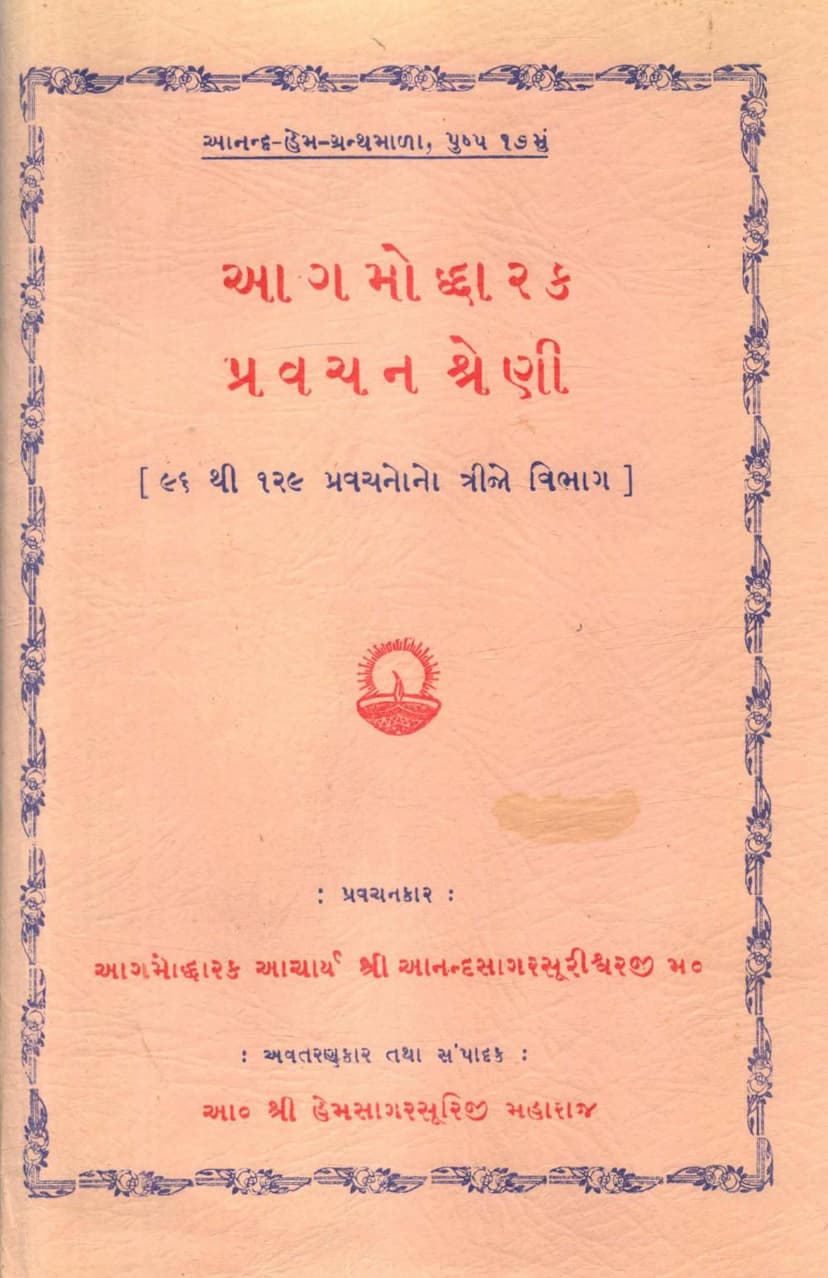Agamoddharak Pravachan Shreni 096 To 129
Added to library: September 1, 2025

Summary
This Jain text, titled Agamoddharak Pravachan Shreni, Book 096 to 129, is a collection of discourses by Acharya Shri Anandsagarsurishwarji, compiled and edited by Acharya Shri Hemsagarsuriji. Published by Anand Hem Granthmala, this is the third volume of the series, covering discourses from number 96 to 129. The discourses were delivered in Mumbai during the Chaturmas of Samvat 1988.
The editorial statement highlights the transient nature of worldly existence and the rarity of the human birth, which is a precious opportunity for spiritual advancement. Despite having the potential for spiritual progress, many humans fail to heed the teachings of the Tirthankaras due to a lack of true understanding and devotion. The text emphasizes that hearing and accepting the words of the omniscient Tirthankaras is possible only through auspicious karma. In the absence of Tirthankaras, their teachings are accessible through learned monks like Acharya Shri Anandasagar Surishwarji, who is described as an unparalleled scholar of the Agamas and the first to inscribe the Agamas on copper and stone.
The discourses, originally transcribed by Acharya Shri Hemsagar Suriji over 40 years prior, were later organized with headings and presented to the public for reading and understanding. The first volume of this series was published by Bhaykhala Motisha Seth's Derasarji, and the second volume is also in the process of being printed. This third volume was printed at Bahadur Singhji Press in Palitana.
The table of contents provides a detailed list of the topics covered in each discourse from 96 to 129, touching upon various aspects of Jain philosophy, ethics, and practice. The themes include:
- Spiritual Discourses (Pravachans 96-129):
- Nature of Dharma: Discourses explore the true nature of Dharma as an inner realization rather than external rituals, using the analogy of the musk deer and its scent.
- Karma and Liberation: Emphasis is placed on the consequences of karma, the understanding of virtues and vices, the path to liberation through right faith, knowledge, and conduct.
- Detachment and Renunciation: Topics like the futility of worldly attachments, the importance of renunciation, and the understanding of detachment amidst worldly activities are discussed.
- Ethical Principles: The discourses delve into concepts of non-violence (Ahimsa), truthfulness, non-possession, and non-attachment, explaining their practical application in daily life.
- Spiritual Practices: The text discusses the significance of meditation, asceticism (tapasya), and other spiritual disciplines for soul purification and progress.
- Philosophical Concepts: Various Jain philosophical concepts like the nature of the soul, rebirth, karma, liberation, and the Tirthankara's teachings are explained.
- Moral Stories and Examples: The discourses are enriched with stories from Jain scriptures and history to illustrate moral and spiritual lessons.
- Distinguishing Righteousness from Worldliness: The importance of discerning true spiritual conduct from mere external rituals and worldly desires is stressed.
- The Role of Knowledge and Understanding: The text emphasizes that true knowledge and understanding are crucial for spiritual liberation, and mere intellectual knowledge without practical application is insufficient.
- The Nature of the Soul and its Journey: The discourses explain the soul's inherent nature, its journey through the cycle of birth and death, and the path to its ultimate liberation.
- The Significance of the Tirthankaras and Spiritual Preceptors: The teachings and examples of Tirthankaras, Acharyas, and other spiritual guides are presented as essential for spiritual growth.
- The Path to Moksha: The ultimate goal of Moksha (liberation) is explained as the result of sincere spiritual practice, detachment, and the eradication of karma.
The publisher, Anand-Hem Granthmala, states this is the 13th publication in their series. The first edition had 1001 copies, published in Veer Samvat 2448, Vikram Samvat 2028, and 1972 CE. The book was printed at Shree Bhanuchandra Nanchand Mehta, Bahadur Singhji Printing Press, Palitana (Saurashtra).
The editorial statement concludes with a heartfelt wish for the readers to strive diligently in developing right faith, knowledge, and conduct, which are the extraordinary causes for attaining liberation, after reading and studying this book.
The summary of the content indicates that the discourses cover a wide spectrum of Jain philosophy, aimed at guiding the reader towards spiritual enlightenment and liberation from the cycle of birth and death. The emphasis is on understanding the true nature of Dharma, the role of karma, the importance of detachment, and the path to self-realization through the teachings of the Tirthankaras and the guidance of learned Acharyas.